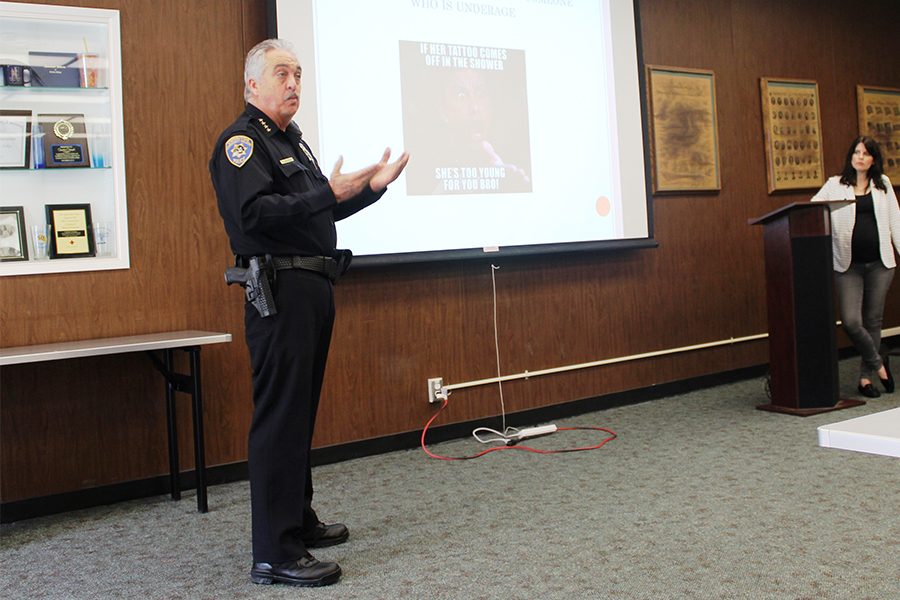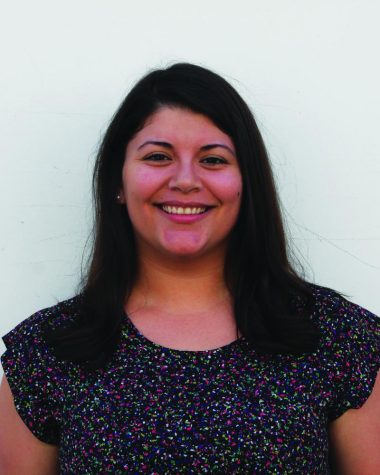Associate Dean of Student Health Hillary Mennella said, “Once we stop accepting domestic violence, stalking, sexual assault, and abuse as a norm then society will change for the better; our campus is an excellent place to change norms and reduce stigma. We want our students, faculty, and staff to be Falcon Safe and happy so that they may reach their educational and professional goals.”
On Wednesday Feb. 8 ASCC Senate had a Falcon Safe Presentation by Mennella and Cerritos College Police Chief Tom Gallivan.
Mennella introduced Falcon Safe, to create and maintain Cerritos College, environment free from sexual assault and other forms of violence.
“It is important for us to educate one another about our rights and to share our resources, to let people know where they can turn to if they find themselves or friend in a situation where they are the victims or who may be feeling coerced, scared, or alone,” said Manella.
Many students are victims of sexual violence, domestic violence, dating violence, and stalking.
She added that consent shouldn’t be assumed, if you are unsure about it make sure to clarify it with your partner before initiating sexual activity.
Consent shouldn’t be assumed by:
- Appearance
- Body Language
- Non-Verbal Communication
- Previous Sexual Activity
- Dating Relationships
- Marriage
- Under the influence of Alcohol or other drugs
According to Mennella, students can experience depression, anxiety during college and signs or symptoms of other serious psychologist disorders that may not be present until a student is in early adulthood.
A psychologist has the expertise to diagnose and treat psychological disorders, provide counseling and assist in a crisis.
Dr. Hernandez is a resource for campus outreach and educational presentations on topics of mental health, relationship difficulties, trauma, life management strategies, and grief counseling.
Gavillan introduced the Bystander effect during the presentation; it occurs when there is an emergency many individuals stand by and never reach out to help.
Steps for Bystander:
- Notice the situation
- Evaluate the situation as a problem or potential harm
- Assume responsibility
- Know what to do
- Act
“Many people see something but don’t call the police…If you see something, do something,” Gavillan said.
He suggested if there is any emergency happening on campus, call the the campus police as soon as possible.
He also said if students don’t have their cellphones with them they can use the emergency systems around campus.
If you are a victim :
- Take all threats seriously, call 911 if you are in danger.
- Talk to the police about protective orders.
- Contact a hotline.
- Tell friends, family, and others you trust about your situation and develop a plan when you need help.
- Avoid being alone.
- During an assault, consider negotiating, stalling for time, screaming, resisting.
- Keep proof of every incident and report them to the law enforcement and campus authorities.
- Get medical care as soon as possible for injuries, pregnancy prevention, or STD testing.
Valyncia C. Raphael, Director, Diversity Compliance and Title IV Coordinator said, there are many useful resources that are local, in the community and online for someone that is coping.
“On campus, we have excellent mental health support and more information can be found in the Student Health Services webpage. Also, there are many community and national services and 24 hour hotlines, many are listed in the Project Safe brochure.”
She added that seeking help is one big step toward healthy coping, and counseling can help start that process.
Raphael will be working with Mennella and Gavillan to give presentations to groups across campus.
Vice President of ASCC, Enrique Rodriguez said the presentation was very informative and it opened the eyes of many so they know where to go for help, who to call, and what steps to take, if they’re in that position or know any friend that is going through that.
He continued to say that as a father he can now educate his daughter about stalking, bullying, and abuse for her safety and also so she can pass it on to others.
Gurpreet Ubbu, ASCC Senator Pro Tem said, “I thought it was great, and very informative. I feel like [these] topic[s] [are] not discussed a lot because [they are] really sensitive.”
She added that it’s great for students because a lot students are victims of bad relationships or violence and don’t know that there’s resources and support for them.
“I’m hoping a lot of senators go out and tell this information to other students because voice of mouth is the best way of publicizing,” Ubbu said.











